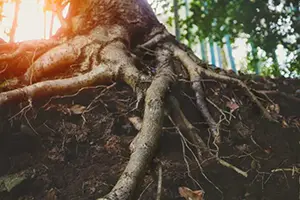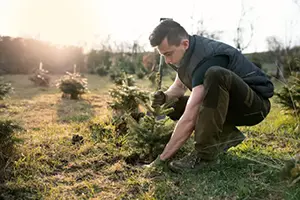They provide your yard with much-needed shade for your house, maybe you have fond memories of the treehouse you built out in the back. While we love our trees, they can pose some risks to your home. If not monitored carefully an otherwise desirable tree might be threatening your home and its foundation. Here at Merritt’s Tree Service, we have provided helpful tips to know the risks and preventative options available when dealing with tree roots.
Effects on the Soil
Trees of all sizes can be mighty! Tree roots work to expand and search for water. Two primary types of soil can have considerable effects on tree growth. Soil that is primarily composed of clay, becomes dense and compacts tree roots as they push through. Comparatively, soil made up of loose dirt and rocks will shift and become displaced, allowing the roots freedom to move through it. The type of damage that may result for your Waterloo, IL residence depends on the type of soil under your home. Weather conditions also pose an impact on the soil beneath them. Shrinkage can occur during dry droughts as opposed to expansion during heavy rains. It is highly useful to know which type of soil a house sits on as the structural integrity can be damaged by shrinkage and expansion.

Foundation Damage
A common misconception is that tree roots cause foundation damage, they are not solely responsible. The damage done to home foundations is primarily caused by the changes in soil conditions. These changes often present themselves in the form of concrete settling. Shifting and cracking are dangerous, this is more likely to occur when concrete settles. The severity of the overall structure of your home depends on how significant the movement is. New Waterloo, IL homes may not experience or be disrupted by cracks in the concrete due to root activity. Residential foundations have a higher risk of being impacted by concrete shifts due to settling. Older homes pose a higher threat to suffer damage to the entire structure. Ceilings may become lopsided, support beams may shift, and walls may submerge or crack.
Generally, concrete settling will result in structural damage in an older home, and it is not always a hazard. It is easy to place the blame on a tree for foundation damage as they are often seen as a home landscape invader. There are various reasons besides tree roots that can cause foundation damage. Examples are: Poorly insulated basements, gardens planted too close to the foundation, and drainage pipes are all factors to consider for soil dehydration and concrete settling.
Preventing Root-Related Damage
There are several preventive measures when concerned about root damage to your foundation. Concerns usually arise after a foundation has been laid and nearby trees have already been established in place. Building a root barrier and cutting away roots as you dig that are approaching your foundation is one way to address the issue. When deciding to plant a new tree, make sure to select a slow-growing species, such as an oak or sugar maple tree to avoid the threat of root damage. Always keep in mind how large your yard is before planting a tree. Though many believe that a tree will develop roots as broad as the height of the tree. A tree grows roots two to three times its height! You should always consider the landscape space available to provide adequate space for a tree’s roots.
Building a New Structure

When building your new Waterloo, IL home, you can take various steps to prevent root damage. Older homes on shallow foundations are vulnerable to root damage and concrete settling as opposed to homes built with full basements. Houses built with full basements provide structural protection, unlike shallow foundations that are prone to dried-out soil conditions and shifts.
Save Those Trees
There is no need to start cutting trees immediately! Utilizing avoidance strategies or receiving an analysis of your soil type and foundation status can alert you of any major threat to your home. Cutting down trees should be a final resort. If you are worried about invasive roots, suspect foundation damage, soil changes, or concrete settling, Call Merritt’s Tree Service today! Our team of professional arborists will provide an assessment of your trees, soil, and a variety of solutions. Merritt’s Tree Service is here to help